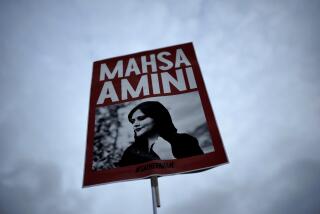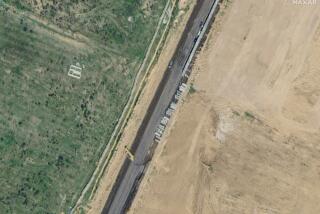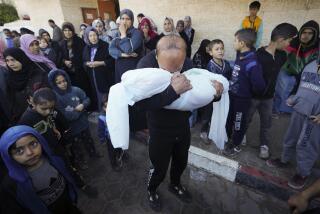Egyptian government under pressure from Islamists, liberals
CAIRO — The military-backed government faced pressure on two fronts Thursday as Islamists set fire to a public building and threatened fresh protests while liberal parties condemned the deadly crackdown on the Muslim Brotherhood that has damaged Egypt’s international stature.
As the death toll in Wednesday’s police raids on Islamist protests rose to 638, liberal factions, including supporters of the coup that overthrew President Mohamed Morsi last month, criticized the army’s tight grip on the interim government and new threats by the Interior Ministry to use lethal force.
Liberals fear a return to the style of police state that for three decades bolstered Hosni Mubarak, who was overthrown in a 2011 uprising led by young liberal activists. They, like their nemesis the Brotherhood, have been outmaneuvered by generals and security officials in a battle to shape the country’s future.
“Although we do not fully approve of the government, we do believe we have to work with them,” said Ahmad Abdou, a leader of the group Rebel, which sponsored massive protests against Morsi in June. “But we will not allow the return of the [Mubarak] regime. We will fight until our last breath.”
The stakes are high. Four people were killed Thursday in clashes in Alexandria. Churches were attacked across the country. Islamist protesters reportedly threw Molotov cocktails and set fire to the municipal building in Giza, outside Cairo. About the same time, flag-draped coffins of police officers killed in Wednesday’s clashes were driven slowly through the capital.
The Brotherhood, which said that more than 2,000 people had died nationwide after police stormed two pro-Morsi sit-ins in Cairo, vowed to protest until the former president is reinstated. The government kept Morsi in detention on what are widely regarded as trumped-up charges of espionage.
“We will always be nonviolent and peaceful. We remain strong, defiant and resolved,” Brotherhood spokesman Gehad Haddad posted on his Twitter account. “We will push forward until we bring down this military coup.”
That is all but impossible. Gen. Abdel Fattah Sisi, commander of the armed forces, is the power behind the government. He appeared to have sided with hard-liners in ordering the crackdown, which led to the resignation of Vice President Mohamed ElBaradei, a Nobel laureate and the nation’s most prominent liberal.
ElBaradei’s departure was followed by harsh international criticism, including from President Obama, over Egypt’s handling of the latest crisis. The move by ElBaradei also highlighted the egos, lack of organization and conflicting agendas that have beset liberals for years.
The Rebel group, which had called for ElBaradei’s inclusion in the government, turned on him. “You have chosen to beautify your international image in front of your friends around the world at the expense of your national image in front of the Egyptian people and of your role” as vice president, it said in a statement after the resignation.
That sentiment was shared by ElBaradei’s National Salvation Front. Liberals supported the military in removing an Islamist president, but they also vilified the generals for human rights abuses when the army ruled the country after Mubarak’s fall. That irony has been tough to square since the army’s robust return to the political scene.
In backing the military, liberals appear to have helped prevent Islamists from building Islamic law into an amended constitution. The question, though, is how to protect civil rights, including freedom of the press and political expression, from generals who disdain opposition and have imposed emergency law.
“The current state is difficult because it’s militarized,” said activist Radwan Adam, a socialist. “The military has not left power since [2011]. They are the authors and directors of this scenario.... The Muslim Brotherhood was just competing with them for the role of the protagonist.”
The army enjoys broad public support. There has been little domestic backlash against Wednesday’s crackdown on the Brotherhood, which many Egyptians believed wanted to create an Islamic state. The April 6th movement, a key architect of the uprising against Mubarak, believes that both the Brotherhood and the army are authoritarian.
“It has become clear that all the parties fighting over power do not care for Egyptians,” it said in a statement Thursday. “The Muslim Brotherhood’s leaders sacrificed its members for the sake of power while the security forces did not stop from attacking violently those same members.”
That danger is likely to intensify as the Interior Ministry’s security forces and police rise in prominence, as they did under Mubarak. The police were the reviled symbol of the old guard but they, and the military, are regarded by many Egyptians as critical to countering the Brotherhood.
The Interior Ministry “has given instructions to all forces to use live ammunition in the face of any attacks on establishments or forces within the framework of the regulations of using the legitimate right of self-defense,” it said in a statement. “All the forces assigned to securing and protecting these establishments were provided with the weapons and the ammunition necessary to deter any attack that may target them.”
The lack of influence that Rebel and other liberal parties have on the interim government became evident this week with the appointment of 25 governors, at least 15 of whom are retired military and police generals. Rebel opposed the appointments.
“We said it several times,” Abdou said, “but what are we to do? We don’t have a choice.”
Special correspondent Ingy Hassieb contributed to this report.
More to Read
Start your day right
Sign up for Essential California for news, features and recommendations from the L.A. Times and beyond in your inbox six days a week.
You may occasionally receive promotional content from the Los Angeles Times.







